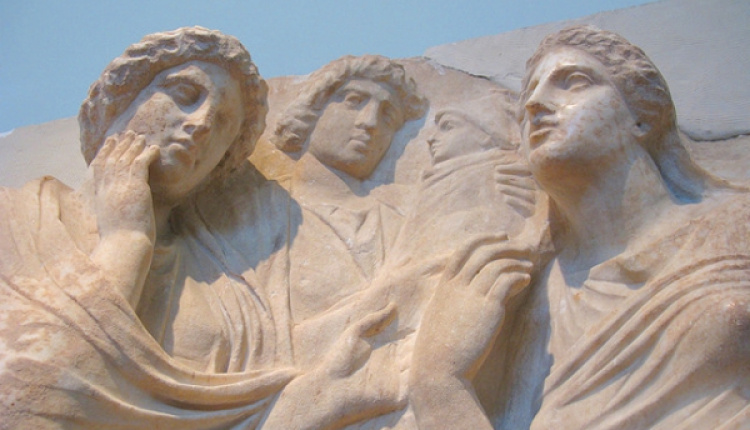The Ancient Greeks’ Six Words For Love
- by XpatAthens
- Thursday, 29 December 2016

Looking for an antidote to modern culture's emphasis on romantic love? Perhaps we can learn from the diverse forms of emotional attachment prized by the ancient Greeks.
Today's coffee culture has an incredibly sophisticated vocabulary. Do you want a cappuccino, an espresso, a skinny latte, or maybe an iced caramel macchiato?
Today's coffee culture has an incredibly sophisticated vocabulary. Do you want a cappuccino, an espresso, a skinny latte, or maybe an iced caramel macchiato?
The ancient Greeks were just as sophisticated in the way they talked about love, recognizing six different varieties. They would have been shocked by our crudeness in using a single word both to whisper 'l love you' over a candlelit meal and to casually sign an email 'lots of love.'
So what were the six loves known to the Greeks? And how can they inspire us to move beyond our current addiction to romantic love, which has 94 percent of young people hoping—but often failing—to find a unique soul mate who can satisfy all their emotional needs?
1. Eros, or sexual passion
So what were the six loves known to the Greeks? And how can they inspire us to move beyond our current addiction to romantic love, which has 94 percent of young people hoping—but often failing—to find a unique soul mate who can satisfy all their emotional needs?
1. Eros, or sexual passion
The first kind of love was eros, named after the Greek god of fertility, and it represented the idea of sexual passion and desire. But the Greeks didn't always think of it as something positive, as we tend to do today. In fact, eros was viewed as a dangerous, fiery, and irrational form of love that could take hold of you and possess you—an attitude shared by many later spiritual thinkers, such as the Christian writer C.S. Lewis.
Eros involved a loss of control that frightened the Greeks, which is odd, because losing control is precisely what many people now seek in a relationship. Don't we all hope to fall 'madly' in love?
2. Philia, or deep friendship
The second variety of love was philia or friendship, which the Greeks valued far more than the base sexuality of eros. Philia concerned the deep comradely friendship that developed between brothers in arms who had fought side by side on the battlefield. It was about showing loyalty to your friends, sacrificing for them, as well as sharing your emotions with them. Another kind of philia, sometimes called storge, embodied the love between parents and their children.
We can all ask ourselves how much of this comradely philia we have in our lives. It's an important question in an age when we attempt to amass friends on Facebook or followers on Twitter—achievements that would have hardly impressed the Greeks.
3. Ludus, or playful love
This was the Greeks' idea of playful love, which referred to the affection between children or young lovers. We've all had a taste of it in the flirting and teasing stages of a relationship, but we also live out our ludus when we sit around in a bar bantering and laughing with friends, or when we go out dancing.
3. Ludus, or playful love
This was the Greeks' idea of playful love, which referred to the affection between children or young lovers. We've all had a taste of it in the flirting and teasing stages of a relationship, but we also live out our ludus when we sit around in a bar bantering and laughing with friends, or when we go out dancing.
Dancing with strangers may be the ultimate ludic activity, almost a playful substitute for sex itself. Social norms may frown on this kind of adult frivolity, but a little more ludus might be just what we need to spice up our love lives.
4. Agape, or love for everyone
The fourth love, and perhaps the most radical, was agape or selfless love. This was a love that you extended to all people, whether family members or distant strangers. Agape was later translated into Latin as caritas, which is the origin of our word 'charity.'
C.S. Lewis referred to it as 'gift love,' the highest form of Christian love. But it also appears in other religious traditions, such as the idea of mettā or 'universal loving kindness" in Theravāda Buddhism.
There is growing evidence that agape is in a dangerous decline in many countries. Empathy levels in the U.S. have declined sharply over the past 40 years, with the steepest fall occurring in the past decade. We urgently need to revive our capacity to care about strangers.
To read this article in full, please visit: Yes Magazine
4. Agape, or love for everyone
The fourth love, and perhaps the most radical, was agape or selfless love. This was a love that you extended to all people, whether family members or distant strangers. Agape was later translated into Latin as caritas, which is the origin of our word 'charity.'
C.S. Lewis referred to it as 'gift love,' the highest form of Christian love. But it also appears in other religious traditions, such as the idea of mettā or 'universal loving kindness" in Theravāda Buddhism.
There is growing evidence that agape is in a dangerous decline in many countries. Empathy levels in the U.S. have declined sharply over the past 40 years, with the steepest fall occurring in the past decade. We urgently need to revive our capacity to care about strangers.
To read this article in full, please visit: Yes Magazine
